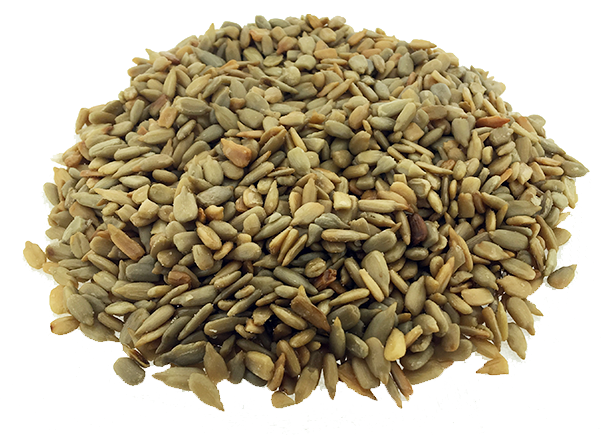Sunflower Seeds

Varieties Available
- Shelled raw sunflower seeds
- Shelled roasted (no salt) sunflower seeds
- Shelled roasted salted sunflower seeds
Health benefits of sunflower seeds
- Delicious, nutty, and crunchy sunflower seeds are widely considered as healthful foods. They are high in energy; 100 g seeds hold about 584 calories.
- Much of their calories come from fatty acids. The seeds are especially rich in poly-unsaturated fatty acid linoleic acid, which constitute more 50% fatty acids in them. They are also good in mono-unsaturated oleic acid that helps lower LDL or “bad cholesterol” and increases HDL or “good-cholesterol” in the blood.
- Sunflower seeds are a very good source of proteins loaded with fine quality amino acids such as tryptophan that are essential for growth, especially in children. Just 100 g of seeds provide about 21 g of protein (37% of daily-recommended values).
- Sunflower seeds contain health benefiting poly-phenol compounds such as chlorogenic acid, quinic acid, and caffeic acids. These compounds are natural anti-oxidants, which help remove harmful oxidant molecules from the body. Further, chlorogenic acid helps reduce blood sugar levels by limiting glycogen breakdown in the liver.
- Sunflower seeds are a very rich source of vitamin E; contain about 35.17 g per 100 g (about 234% of RDA). Vitamin E is a powerful lipid soluble antioxidant, required for maintaining the integrity of cell membrane of mucus membranes and skin by protecting it from harmful oxygen-free radicals.
- Sunflower seeds are one of the finest sources of B-complex group of vitamins. They are very good sources of B-complex vitamins such as niacin, folic acid, thiamin (vitamin B1), pyridoxine (vitamin B6), pantothenic acid, and riboflavin.
- Sunflower seeds are incredible sources of folic acid. 100 g of kernels contains 227 µg of folic acid, which is about 37% of recommended daily intake. Folic acid is essential for DNA synthesis.
- Niacin and pyridoxine are other B-complex vitamins found abundantly in the sunflower seeds. About 8.35 mg or 52% of daily-required levels of niacin is provided by just 100 g of seeds. Niacin helps reduce LDL-cholesterol levels in the blood. Niacin enhances GABA activity inside the brain, which in turn helps to reduce anxiety and neurosis.
- Sunflower seeds are incredibly rich sources of many essential minerals. Calcium, iron, manganese, zinc, magnesium, selenium and copper are especially concentrated in sunflower seeds. Many of these minerals play a vital role in bone mineralization, red blood cell production, enzyme secretion, hormone production, as well as in the regulation of cardiac and skeletal muscle activities.
Just a handful of sunflower seeds a day provides much of the recommended level of phenolic anti-oxidants, minerals, vitamins and protein.
Storage
Store in a cool dry place. Ok to refrigerate or freeze.
Nutritional information sources: nutrition-and-you.com, USDA National Nutrient data base
| Principle | Nutrient Value | Percentage of RDA |
|---|---|---|
| Energy | 584 Kcal | 29% |
| Carbohydrates | 20 g | 15% |
| Protein | 20.78 g | 37% |
| Total Fat | 51.46 g | 172% |
| Cholesterol | 0 mg | 0% |
| Dietary Fiber | 8.6 g | 23% |
| Vitamins | ||
| Folates | 227 µg | 57% |
| Niacin | 8.335 mg | 52% |
| Pantothenic acid | 1.130 mg | 22% |
| Pyridoxine | 1.345 mg | 103% |
| Riboflavin | 0.355 mg | 27% |
| Thiamin | 1.480 mg | 123% |
| Vitamin A | 50 IU | 1.6% |
| Vitamin C | 1.4 | 2% |
| Vitamin E | 35.17 mg | 234% |
| Electrolytes | ||
| Sodium | 9 mg | 1% |
| Potassium | 645 mg | 14% |
| Minerals | ||
| Calcium | 78 mg | 8% |
| Copper | 1.800 mg | 200% |
| Iron | 5.25 mg | 63% |
| Magnesium | 325 mg | 81% |
| Manganese | 1.950 mg | 85% |
| Phosphorus | 660 mg | 94% |
| Selenium | 53 µg | 96% |
| Zinc | 5.00 mg | 45% |
| Phyto-nutrients | ||
| Carotene-ß | 30 µg | — |
| Crypto-xanthin-ß | 0 µg | — |
| Lutein-zeaxanthin | 0 µg | — |













